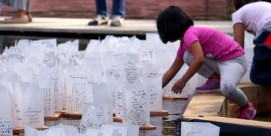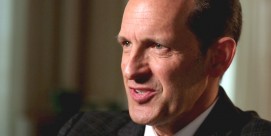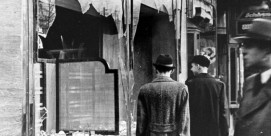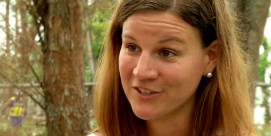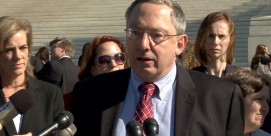In This Episode << SLIDE LEFT TO SEE ADDITIONAL SEGMENTS
The Church and the Fall of the Wall
DEBORAH POTTER, correspondent: St. Nikolai Evangelical Lutheran Church hasn’t changed much since the sixteenth century. Bach once played the organ here, and the music is still a draw. But on this day the tourists have come to hear about the church’s more recent history from the man who led it through a difficult time. Christian Fuhrer became pastor here in 1980, when the world outside the church was divided by the Cold War and Germany was split in two, most visibly by the wall the East German government built in Berlin in 1961. The Communist state was determined to keep more of its people from escaping to the free West. In the German Democratic Republic—the GDR—atheism was the norm. Churches like St. Nikolai were spied on, but stayed open.
PASTOR CHRISTIAN FUHRER (in translation): In the GDR, the church provided the only free space. Everything that could not be discussed in public could be discussed in church, and in this way the church represented a unique spiritual and physical space in which people were free.
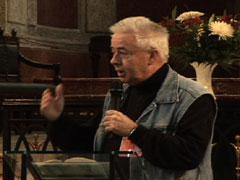 Pastor Christian Fuhrer |
POTTER: In the early eighties, Fuhrer began holding weekly prayers for peace. Every Monday, they recited the Beatitudes from the Sermon on the Mount. Few people came. But in the late eighties, as the Soviet Union opened up to the West, more East Germans began to demand change, including the right to leave, and in Leipzig they gathered at St. Nikolai, which proclaimed itself “open for all.”
PR. FUHRER (in translation): The special experience that we had during the years of peace prayers and then with this massive number of non-Christians in the church, which was exceptional, was that they accepted the message of Jesus.
POTTER: As a college student, Sylke Schumann was one of the hundreds and then thousands who joined the vigils in the sanctuary and marched in the streets holding candles.
SYLKE SCHUMANN: Seeing all these people gather in this place and then from week to week and more and more people gathering, you had the feeling this time really the government had to listen to you.
POTTER: In October 1989, on the 40th anniversary of the GDR, the government cracked down. Protestors in Leipzig were beaten and arrested. Two days later, St. Nikolai Church was full to overflowing for the weekly vigil. When it was over, 70,000 people marched through the city as armed soldiers looked on and did nothing.
PR. FUHRER (in translation): In church people had learned to turn fear into courage, to overcome the fear and to hope, to have strength. They came to church and then started walking, and since they did not do anything violent, the police were not allowed to take action. They said, “We were ready for anything, except for candles and prayer.”
SCHUMANN: I remember it was a cold evening, but you didn’t feel cold, not just because you saw all the lights but also because you saw all these people, and it was, you know, it was really amazing to be a part of that, and you felt so full of energy and hope. For me, it still gives me the shivers thinking of that night. It was great.
POTTER: Just one month after that massive demonstration, the wall between East and West here in Berlin came down. The church had sent a powerful message: the East German government no longer controlled its people.
The joy and relief on that day 20 years ago became reality thanks in part to the effort of one tenacious pastor and what he describes as his firm faith in this teaching of Jesus: “Blessed are the peacemakers.”
PR. FUHRER (in translation): If any event ever merited the description of “miracle” that was it—a revolution that succeeded, a revolution that grew out of the church. It is astonishing that God let us succeed with this revolution.
POTTER: Fuhrer, who retired last year at age 65 as required by his church, has written a book about those historic days. St. Nikolai itself has gone back to being a parish church, its congregation not much larger than before. But Fuhrer says he didn’t do what he did back then to draw people to the church. In his words, “We did it because the church has to do it.”
For Religion and Ethics Newsweekly, I’m Deborah Potter in Leipzig.

